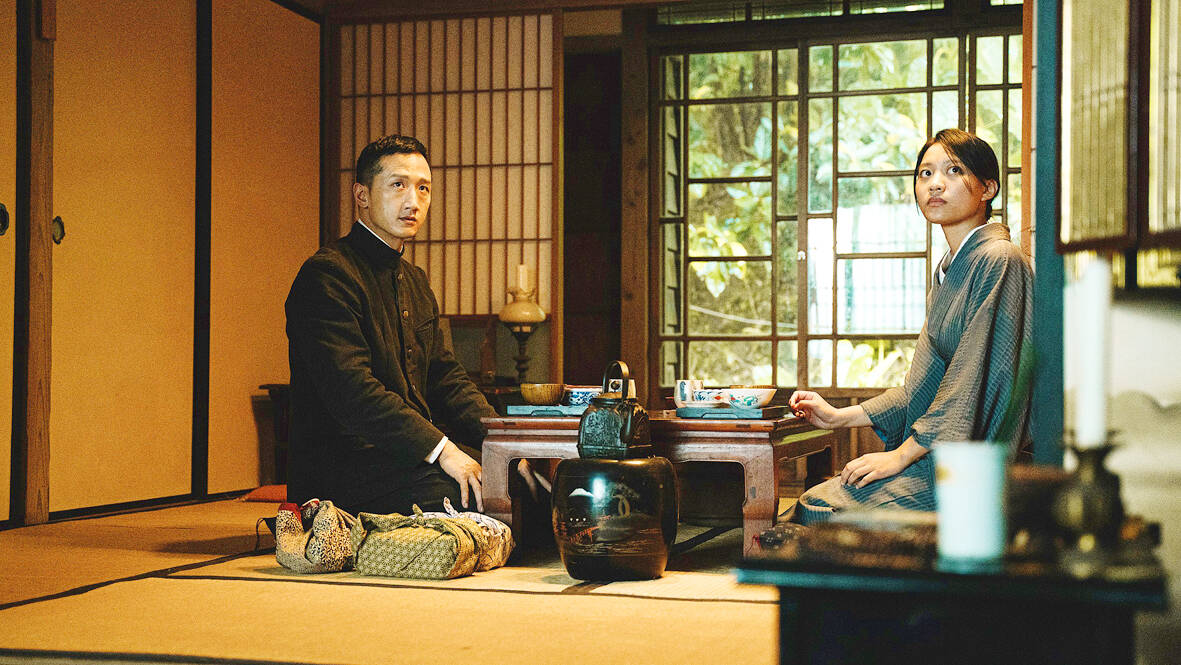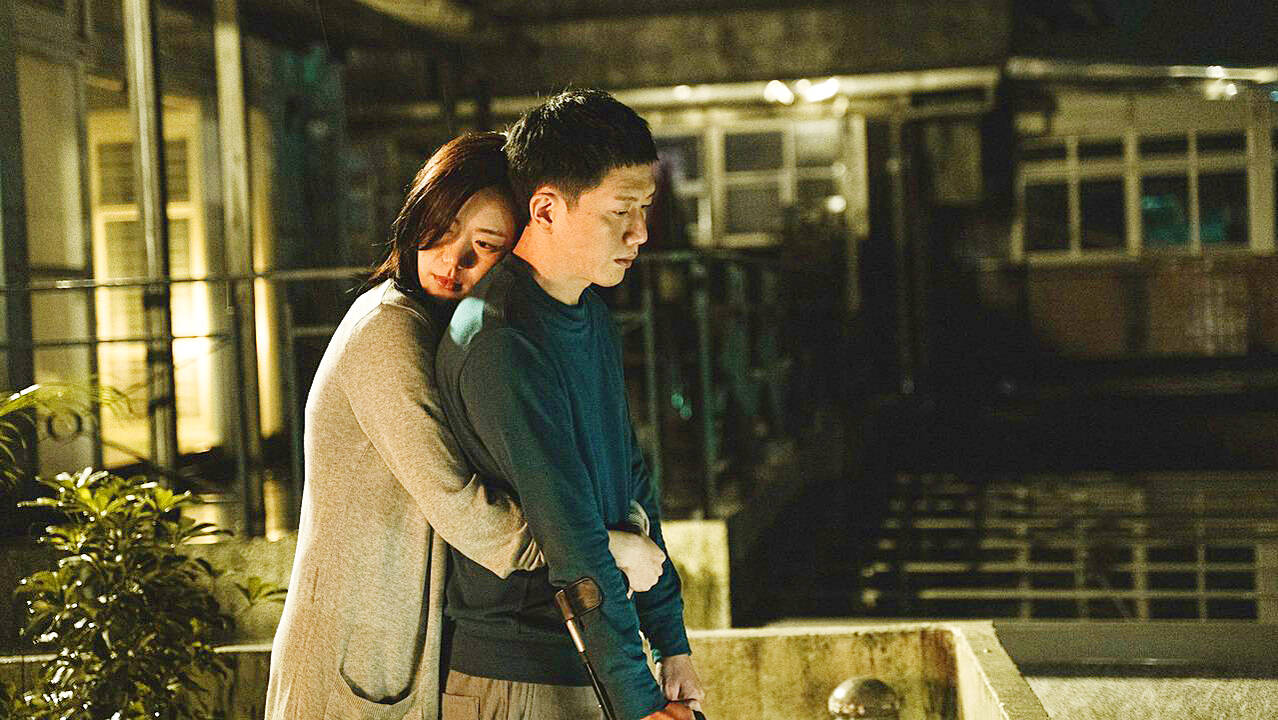Struggling with his once-promising career, dispirited astronomer Cheng-hsiu (Mo Tzu-yi, 莫子儀) has pushed his wife and child away from him, moving lifelessly through his days, and haunted by his dreams and personal demons. The slowness is also literal, as Cheng-hsiu walks with a cane due to a congenital leg condition.
Murmurs of Memories is an oblique and rather confusing story that shifts between the present, Cheng-hsiu’s childhood and a seemingly unrelated tale of a Paiwan princess (Chien Hsiao-yi, 簡孝儀) who is forced away from her idyllic life to become the wife of a Japanese commander during the Japanese colonial era. The only part that initially connects the two eras at first are the colliding binary stars whose brightness can be seen during the day, a topic that Cheng-hsiu has repeatedly failed in obtaining funding to study despite his early success in the area.
The three parts are further separated by language, Mandarin in the present, Hoklo (also known as Taiwanese) during the flashbacks and Paiwan/Japanese in the historic tale, showing the cultural shifts in Taiwan over a century.

Photo courtesy of CPT Entertainment
Most of the film relies on such implicit connections that the audience may or may not make. Some are slightly more obvious, but very little is said directly. For those who aren’t adept at detecting such subtleties, Murmurs of Memories still makes for a moody, artsy piece about modern, middle-aged loneliness, but there’s apparently much more below the surface. Even the presenter at the beginning of the premiere screening said that it’s a film that might need to be watched a few times.
There are little hints throughout the film that suggest that the Paiwan princess may be Cheng-hsiu in his past life, especially as the concept of reincarnation is repeatedly brought up. In fact, according to the movie synopsis (which this reviewer usually doesn’t read before going in), it’s a tale about someone who is tortured because they forgot to drink the “mengpo tea” (孟婆湯), which, according to traditional beliefs, erases the memories a previous life before reincarnation.
There’s also some curious parallels, such as Cheng-hsiu being overshadowed at work by a Japanese colleague who turns out to be quite a slimy character, and his brief encounter with female student (it isn’t pictured how far it goes) Pluto (Yeh Ying, 葉穎), who likes to talk about stars and past lives. The synopsis says that she may be Cheng-hsiu’s lover from his past life, but that is in no way apparent from just watching the film.

Photo courtesy of CPT Entertainment
Cheng Hsiu’s wife (Joanne Deng, 鄧九雲), who gave up a piano career to become a housewife, and their young child visibly suffer from his absences and indifferent attitude, but it’s unclear if they refer to anything in the past life, or are they just victims of Cheng Hsiu’s inability to let go of his past. There’s a lot more left unexplained — especially the lack of a backstory in the Japanese era scenes.
Now thinking back, it seems that many scenes that felt out of place while viewing, such as a fight Cheng-hsiu’s daughter got into at school, or him visiting his dying father with his estranged brother, were also placed in there to help Cheng Hsiu slowly snap back to reality.
It’s just hard to analyze all of this while the movie goes on. The gist of the film is apparent, but like most people’s memories, it is disjointed and doesn’t always make immediate sense. Perhaps one will discover new things on a second viewing, but it’s not riveting enough to warrant that.

Google unveiled an artificial intelligence tool Wednesday that its scientists said would help unravel the mysteries of the human genome — and could one day lead to new treatments for diseases. The deep learning model AlphaGenome was hailed by outside researchers as a “breakthrough” that would let scientists study and even simulate the roots of difficult-to-treat genetic diseases. While the first complete map of the human genome in 2003 “gave us the book of life, reading it remained a challenge,” Pushmeet Kohli, vice president of research at Google DeepMind, told journalists. “We have the text,” he said, which is a sequence of

On a harsh winter afternoon last month, 2,000 protesters marched and chanted slogans such as “CCP out” and “Korea for Koreans” in Seoul’s popular Gangnam District. Participants — mostly students — wore caps printed with the Chinese characters for “exterminate communism” (滅共) and held banners reading “Heaven will destroy the Chinese Communist Party” (天滅中共). During the march, Park Jun-young, the leader of the protest organizer “Free University,” a conservative youth movement, who was on a hunger strike, collapsed after delivering a speech in sub-zero temperatures and was later hospitalized. Several protesters shaved their heads at the end of the demonstration. A

Every now and then, even hardcore hikers like to sleep in, leave the heavy gear at home and just enjoy a relaxed half-day stroll in the mountains: no cold, no steep uphills, no pressure to walk a certain distance in a day. In the winter, the mild climate and lower elevations of the forests in Taiwan’s far south offer a number of easy escapes like this. A prime example is the river above Mudan Reservoir (牡丹水庫): with shallow water, gentle current, abundant wildlife and a complete lack of tourists, this walk is accessible to nearly everyone but still feels quite remote.

In August of 1949 American journalist Darrell Berrigan toured occupied Formosa and on Aug. 13 published “Should We Grab Formosa?” in the Saturday Evening Post. Berrigan, cataloguing the numerous horrors of corruption and looting the occupying Republic of China (ROC) was inflicting on the locals, advocated outright annexation of Taiwan by the US. He contended the islanders would welcome that. Berrigan also observed that the islanders were planning another revolt, and wrote of their “island nationalism.” The US position on Taiwan was well known there, and islanders, he said, had told him of US official statements that Taiwan had not